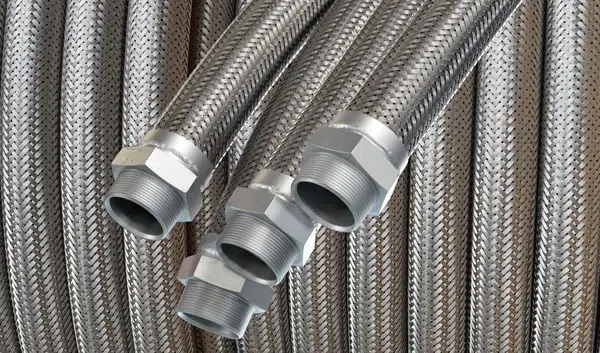Metal hoses are versatile and durable components used across various industries to transport fluids, gases, and other materials. Known for their flexibility, strength, and ability to withstand extreme temperatures and pressures, metal hoses are essential for ensuring safe and efficient operations in industrial systems. This article explores the key features of metal hoses and their critical role in industrial applications.
What Are Metal Hoses?
Metal hoses are flexible tubes made from metallic materials such as stainless steel or other alloys. They are engineered to withstand harsh environments, providing reliable performance in systems where flexibility, pressure resistance, and durability are required. Metal hoses are commonly used to transfer liquids, gases, and powders in industries like chemical processing, oil and gas, automotive, and food production.
Key Features of Metal Hoses
1. Flexibility
One of the primary features of metal hoses is their flexibility. This allows them to bend and twist without breaking, making them suitable for use in systems with complex or confined spaces.
2. High Temperature Resistance
Metal hoses can withstand extreme temperatures, both high and low. This makes them ideal for use in industries such as power generation, where temperature extremes are a concern.
3. Pressure Resistance
Metal hoses are designed to handle high-pressure environments without compromising their structural integrity. They are often used in systems where high-pressure fluid or gas transfer is required.
4. Corrosion Resistance
Made from alloys such as stainless steel, metal hoses offer excellent resistance to corrosion, especially in industries dealing with chemicals or corrosive substances.
5. Durability and Longevity
Metal hoses are known for their durability and long service life. They can endure frequent movement, vibration, and extreme operating conditions without deteriorating, making them cost-effective in the long term.
6. Leak Prevention
The tight construction of metal hoses prevents leaks, ensuring that fluids or gases are contained and transferred safely. This feature is particularly crucial in industries where leaks can lead to hazardous conditions.
Applications of Metal Hoses
Metal hoses are used in a wide range of industrial applications where their unique features provide significant advantages:
- Chemical and Pharmaceutical Industries: Metal hoses are used for transferring corrosive chemicals, gases, and other substances safely. Their resistance to corrosion and extreme temperatures makes them ideal for these sectors.
- Oil and Gas: In the oil and gas industry, metal hoses are essential for transporting high-pressure fluids and gases, often in volatile environments.
- Automotive: Metal hoses are used in automotive systems, such as exhaust systems, fuel lines, and cooling systems, providing durability and flexibility.
- Food and Beverage: Metal hoses are used in food processing and beverage systems, where hygiene, flexibility, and resistance to extreme temperatures are essential.
- Power Generation: In power plants, metal hoses transport steam, hot water, and other high-temperature fluids, ensuring safe and efficient energy production.
- HVAC Systems: Metal hoses are used in heating, ventilation, and air conditioning systems to provide flexibility in pipework and prevent potential damage from vibration and movement.
Benefits of Using Metal Hoses
1. Enhanced Safety
The leak-proof construction and robust design of metal hoses prevent hazardous spills, making them a safer choice for transporting dangerous or flammable substances.
2. Long-Term Cost Savings
While the initial investment in metal hoses can be higher than alternatives, their durability and long lifespan result in reduced maintenance and replacement costs over time.
3. Superior Performance in Harsh Environments
Metal hoses are capable of handling extreme temperatures, pressures, and corrosive substances, ensuring that operations in harsh environments run smoothly.
4. Reduced Downtime
Due to their reliability and resistance to wear, metal hoses help reduce the frequency of system shutdowns and maintenance, ensuring continuous operations.
5. Versatility
Metal hoses can be customized to suit various industrial needs, including specific diameters, lengths, and pressure ratings, making them adaptable to diverse applications.
Factors to Consider When Choosing Metal Hoses
When selecting metal hoses for industrial applications, consider the following factors:
- Material Type: Choose the appropriate alloy (e.g., stainless steel, alloy 316, etc.) based on the environmental conditions, including chemical exposure and temperature range.
- Pressure and Temperature Rating: Ensure the hose can handle the required pressure and temperature for your specific application.
- Flexibility and Bend Radius: Select hoses with the right flexibility for the required installation, ensuring they can bend without kinking.
- Size and Length: Metal hoses come in various sizes and lengths, so choose one that fits the system’s space requirements and fluid flow demands.
- Compliance with Standards: Ensure that the metal hose meets industry standards and regulations, especially in sectors like pharmaceuticals and food processing.
Conclusion
Metal hoses play a pivotal role in optimizing industrial operations by offering flexibility, durability, and resistance to extreme conditions. Their key features, such as high-pressure and temperature resistance, corrosion resistance, and leak prevention, make them essential components in many industries. By choosing the right metal hoses, businesses can ensure the safety, reliability, and longevity of their systems, ultimately enhancing operational efficiency and reducing maintenance costs.







